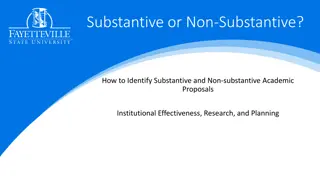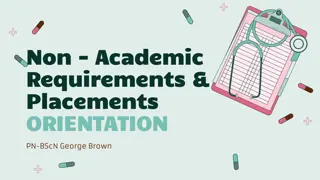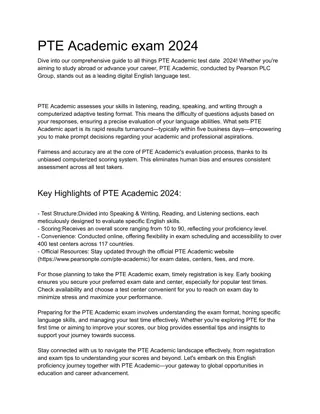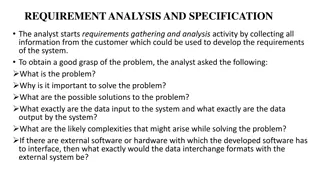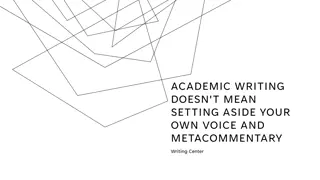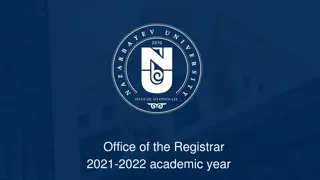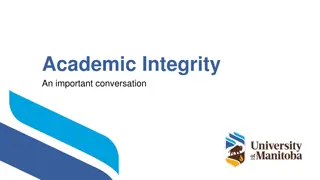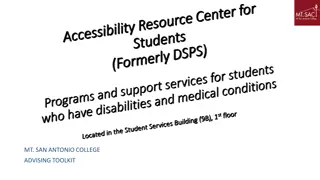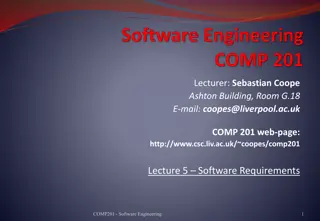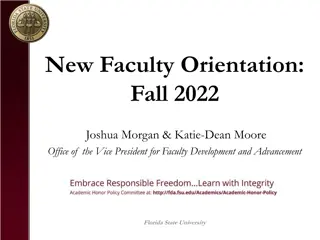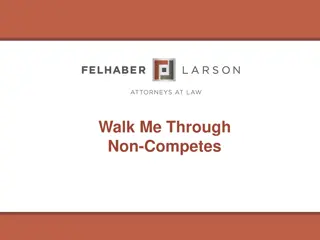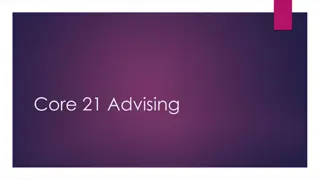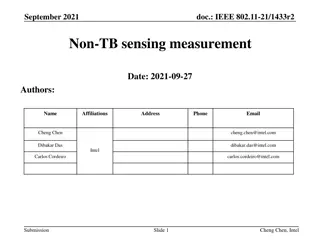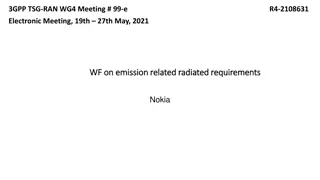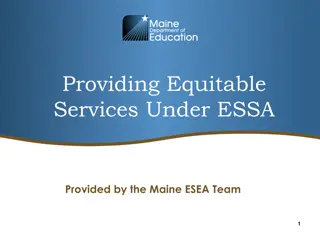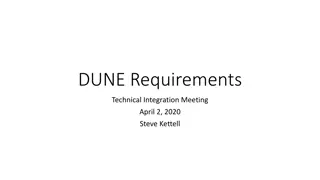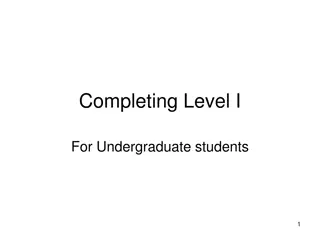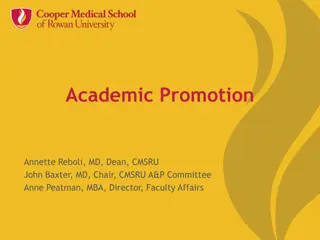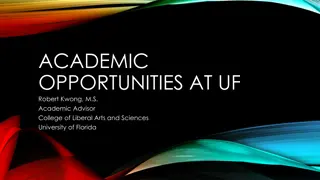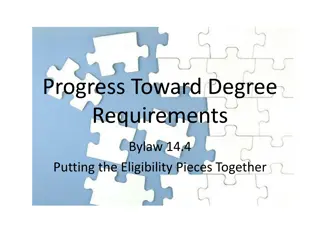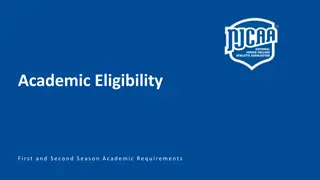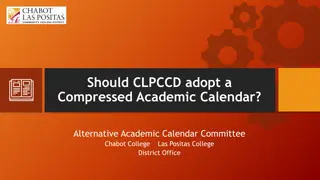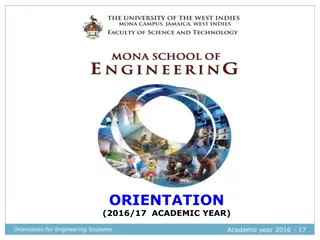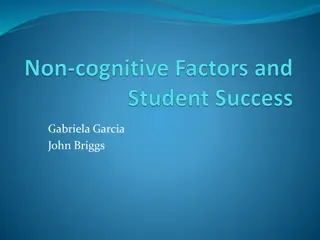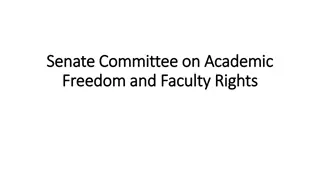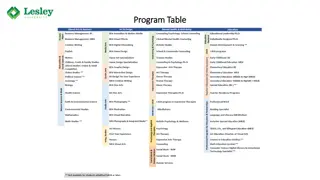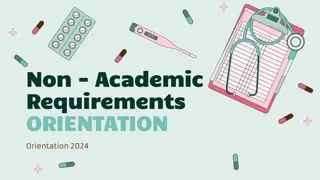Understanding Compliance Considerations for Academic Innovation
Exploring compliance requirements in academic innovation, this content delves into the academic calendar structure, modular classes, intersession programs, and considerations for accelerated degree programs under Federal Title IV regulations. Topics cover the definition of the academic year, credit
6 views • 13 slides
Improving Academic Writing: Key Aspects of Academic Style and Referencing
Learn about academic style in English, principles of referencing, and how to write effectively for assignments. Understand the functions of academic style, such as clear communication and showcasing membership in the academic community. Explore a paragraph analysis on making people work harder, iden
0 views • 29 slides
Understanding CAPC: Curriculum and Academic Policies Council Overview
CAPC, the Curriculum and Academic Policies Council, is a faculty legislative body responsible for recommending changes to academic policies and curriculum. Governed by bylaws, CAPC conducts elections, engages in decision-making processes, and has various committees and subcommittees dedicated to spe
5 views • 45 slides
Identifying Substantive and Non-Substantive Academic Proposals
Learn how to distinguish between substantive and non-substantive academic proposals in institutional effectiveness, research, and planning. Discover the criteria and processes for identifying these proposals, including which ones require specific approvals and reviews from academic committees. Gain
0 views • 23 slides
Understanding Non-Academic Requirements (NARs) for Clinical Placements at George Brown
Non-Academic Requirements (NARs) are essential documents needed for clinical placements at George Brown. These include Criminal Record Checks, communicable disease forms, immunizations, CPR certification, and more. NARs are crucial to safeguard students, staff, and patients, ensuring a safe learning
1 views • 19 slides
Divanto our comprehensive guide to all things PTE Academic test date 2024!
Divanto our comprehensive guide to all things PTE Academic test date 2024! Whether you're aiming to study abroad or advance your career, PTE Academic, conducted by Pearson PLC Group, stands out as a leading digital English language test.\n\n\n\nPTE Academic assesses your skills in listening, readin
2 views • 2 slides
Software Requirement Analysis and Documentation Process
The requirement analysis and specification process involves gathering information from customers, identifying the problem, solutions, data requirements, complexities, and potential interfaces. Key components of a Software Requirements Specification (SRS) document include functional requirements, non
0 views • 23 slides
Embracing Your Voice in Academic Writing
Academic writing doesn't require you to abandon your unique voice. It's about finding a balance between everyday language and academic tone. Avoiding convoluted writing is key to engaging readers. Blending colloquial and academic styles can enhance clarity and audience understanding, making complex
1 views • 19 slides
Office of the Registrar: Academic Year 2021-2022 Overview
This collection provides detailed information about the Office of the Registrar's responsibilities, academic processes, policies, contact emails, office location, and graduate attributes for the academic year 2021-2022 at Nazarbayev University. From managing academic leave to graduation ceremonies,
0 views • 41 slides
Enhancing Academic Writing Skills: Key Concepts and Strategies
Explore the essential elements of academic writing, such as formality, clarity, precision, and objectivity. Learn to use formal English, avoid slang, and maintain an impersonal tone. Discover tips for clearer and more concise writing, along with techniques for rewriting sentences in an academic styl
0 views • 14 slides
Understanding Academic Integrity at the University of Manitoba
Explore the essential aspects of academic integrity, including its definition, importance for students, types of dishonesty, and expectations in a class setting. Discover why students should care about academic integrity, the various types of academic misconduct such as plagiarism and cheating, and
0 views • 28 slides
Access Center Services at Mt. San Antonio College
Mt. San Antonio College offers a range of support services through the Access Center to assist students with disabilities in accessing courses and programs. These services include academic, career, and personal counseling, assistance with academic accommodations, classes on academic strategies, and
0 views • 9 slides
Understanding Non-Aqueous Solvents: Types and Classification
Inorganic non-aqueous solvents play a crucial role in chemical research and industry. This article by Dr. Princy K.G. delves into the classification of solvents based on protonicity, polarity, and aqueous vs. non-aqueous nature. It explores the types of non-aqueous solvents, such as protonic and non
1 views • 29 slides
Mastering Academic Writing: Strategies for Success
Academic writing is a formal style of writing with specific characteristics such as accuracy, brevity, and clarity. Understanding academic style is crucial for success in your course as it reflects your engagement with the content. Successful academic writers read, learn new vocabulary, and have a s
0 views • 23 slides
Understanding Software Requirements and Design Principles
Software requirements play a crucial role in defining what a system should do, while the design describes how it achieves those goals. This lecture series covers the concepts of user and system requirements, techniques for describing system requirements, organizing software requirements in a documen
1 views • 30 slides
Understanding Non-Firm Quantities in Electricity Markets
Non-Firm Quantities in electricity markets involve units with non-firm access not being compensated for their non-firm capacity not getting accommodated on the system. The concept of Firm Access Quantity plays a key role in determining compensation levels for units, with differences in implementatio
0 views • 6 slides
Academic Integrity and Resolution Process at FSU
At Florida State University (FSU), maintaining academic integrity is crucial. The Faculty Development and Advancement (FDA) office plays a key role in resolving allegations of academic misconduct through educational processes. The Academic Honor Policy outlines the responsibilities of students and i
0 views • 13 slides
Understanding Non-Compete Agreements: Enforceability and Requirements
Non-compete agreements are commonly used in the United States to protect businesses from competition by former employees. To be enforceable, these agreements must meet certain requirements, including independent consideration, protection of legitimate business interests, and reasonableness in scope,
0 views • 26 slides
Academic Degree Requirements and Core Curriculum Overview
Academic degree requirements at Cal Lutheran include a minimum of 124 credits with a GPA of 2.0 or above, completion of upper-division courses, and residency requirements. The Core 21 program aims to develop critical thinking skills and a holistic understanding of various disciplines. Additionally,
0 views • 10 slides
Comparison of Trigger-based vs. Non-Trigger-based Sensing Measurement in IEEE 802.11
The document discusses the differences between Trigger-based (TB) and Non-Trigger-based (Non-TB) sensing measurement instances in IEEE 802.11 standards, focusing on who initiates the sensing measurement. TB sensing is initiated by the AP, while Non-TB sensing is initiated by a non-AP STA, enabling o
6 views • 13 slides
Emission Requirements Discussion at 3GPP TSG-RAN-WG4 Meeting #99-e
Discussion at the 3GPP TSG-RAN-WG4 Meeting #99-e focused on emission-related radiated requirements for DL and UL in relation to adjacent channel protection in NR specifications. Various options and candidates for defining ACLR were explored, along with considerations for spurious emissions and OBUE
1 views • 5 slides
Delving into Corpus-Based Information on Academic Speaking
Exploring high-frequency features like chunking and vague category marking in academic speaking, and how these manifest from conversational habits. Analysis includes 3-word and 4-word chunks commonly found in academic conversations. The comparison of academic versus social language use provides valu
0 views • 21 slides
Equitable Services Requirements and Guidelines under ESSA
Equitable Services Requirements and guidelines under ESSA outline the responsibilities of education officials, ombudsman, and private school administrators to ensure fair distribution of federal funds. The ESEA Team in Maine works to uphold Title I, Part A, Migrant Education, Teacher Quality, Englis
0 views • 56 slides
Technical Integration Meeting: DUNE Requirements Overview
Detailed overview of proposed changes and requirements discussed in a technical integration meeting for the DUNE project. The meeting covered outlined changes to owned requirements, proposed alterations to TDR requirements, and consortia requirements. Specific details include changes to EB requireme
1 views • 12 slides
Academic Integrity Board Game Overview
Academic Integrity Board Game offers a fun and educational approach to understanding academic integrity. The game revolves around values like honesty, trust, fairness, respect, responsibility, and courage, as defined by the International Center for Academic Integrity. Players set up the board, place
0 views • 4 slides
Academic Progression Guidelines for Undergraduate Students
Ensure academic progression by achieving a weighted aggregate of 40%+ at each level of study. Requirements differ for Single Honours and Combined Honours students, with conditions related to non-submission, misconduct, grades, and PSRB requirements. Consider options for changing programs if needed.
0 views • 6 slides
Understanding Non-Profit Accounting Essentials
Learn the basics of non-profit accounting, including what defines a non-profit organization, common types of non-profits, governance structures, and legal responsibilities. Discover key insights on IRS and state requirements for non-profits in this informative presentation by Jessica Sayles, CPA fro
0 views • 55 slides
Guidelines for Academic Promotions in Medical School
Academic promotions in a medical school are crucial for recognizing achievements, maintaining competitiveness, and serving the institution's interests. Promotion criteria include teaching effectiveness, scholarly activity, clinical service, and active participation in various communities. Meritoriou
0 views • 47 slides
Welcome to StFX: An Overview of Academic Excellence and Supportive Environment
StFX extends a warm welcome to all, emphasizing its location on Mi'kma'ki territory and the historic treaties. The university boasts award-winning faculty and staff dedicated to student well-being and academic growth since its founding in 1853. The current academic year presents unique challenges, b
0 views • 39 slides
Academic Planning and Graduation Requirements Overview for Class of 2020 and 2021
Providing a comprehensive overview of the academic planning process and graduation requirements for the Class of 2020 and 2021. Topics covered include graduation criteria, credit distribution, additional requirements, and the benefits of advanced courses. Students are guided through academic plannin
0 views • 26 slides
Academic Opportunities and Requirements at UF for Dual Degrees and Minors
Explore the academic opportunities at the University of Florida (UF) including double majors vs. dual degrees, basic criteria for duals and doubles, application requirements, guidelines for minors, and details on certificates. Understand the GPA requirements, course completion criteria, and applicat
0 views • 10 slides
Academic Progress Requirements for Student-Athletes Under Bylaw 14.4
Understanding the academic progress requirements for student-athletes as outlined in Bylaw 14.4 is crucial. From credit-hour requirements to percentage of degree completion and GPA thresholds, this guide clarifies the eligibility criteria at every stage of a student-athlete's academic journey. Compl
0 views • 6 slides
Understanding NJCAA Academic Eligibility Requirements
The NJCAA academic eligibility requirements for student-athletes involve criteria related to full-time term enrollment, academic progress, and seasons of intercollegiate competition. Eligibility is determined by factors such as full-time enrollment status, previous seasons of competition, GPA requir
0 views • 19 slides
Exploring a Compressed Academic Calendar: A Detailed Examination by the Alternative Academic Calendar Committee
The Alternative Academic Calendar Committee at Chabot College and Las Positas College District Office is diligently studying the potential adoption of a compressed academic calendar. With careful consideration of stakeholder input and thorough analysis of the benefits and challenges involved, the co
0 views • 10 slides
Engineering Students' Orientation and Academic Requirements for 2016/17
The orientation and academic guidelines for engineering students in the 2016/17 academic year are outlined, including admission requirements, grade point averages, class of degree classifications, regulations for course progression, and specific course details for Civil Engineering. Students must me
0 views • 13 slides
Exploring Non-Cognitive Factors as Predictors of Student Success in Higher Education
This study delves into whether utilizing an assessment instrument measuring non-cognitive attributes can predict student success at a large, urban, public university with a significant Under-Represented Minority population. The research focuses on non-academic factors like academic self-efficacy, re
0 views • 44 slides
Senate Committee on Academic Freedom and Faculty Rights Overview
The Senate Committee on Academic Freedom and Faculty Rights (SCAFFR) plays a crucial role in addressing issues related to academic freedom, faculty rights, and academic grievances at the University of Utah. The committee investigates academic freedom issues, reviews grievances, oversees the Code of
0 views • 5 slides
University Academic Leadership Structure Overview
The university's academic leadership structure is outlined, including the Academic Council, Academic Coordinators Council, and Department Chairs. The Academic Council oversees various departments led by vice provosts and associate provosts. The Academic Coordinators Council consists of members from
0 views • 4 slides
Non-Academic Requirements (NARs) for Clinical Placements
Non-Academic Requirements (NARs) are essential documents mandated for clinical placements to ensure the safety of students, staff, and patients. These requirements include criminal record checks, communicable disease forms, tuberculosis testing, vaccinations, and other health and safety training. Co
0 views • 18 slides
Academic Reps Responsibilities in Student Leadership Workshop
Explore the role and responsibilities of Academic Reps in a Student Leadership Workshop led by Dr. Amanda Hlengwa and Ms. Kelly Solomon at the Centre for Higher Education Research, Teaching, and Learning. Academic Reps assist first-year students, provide mentorship, liaise with students and faculty,
0 views • 4 slides



